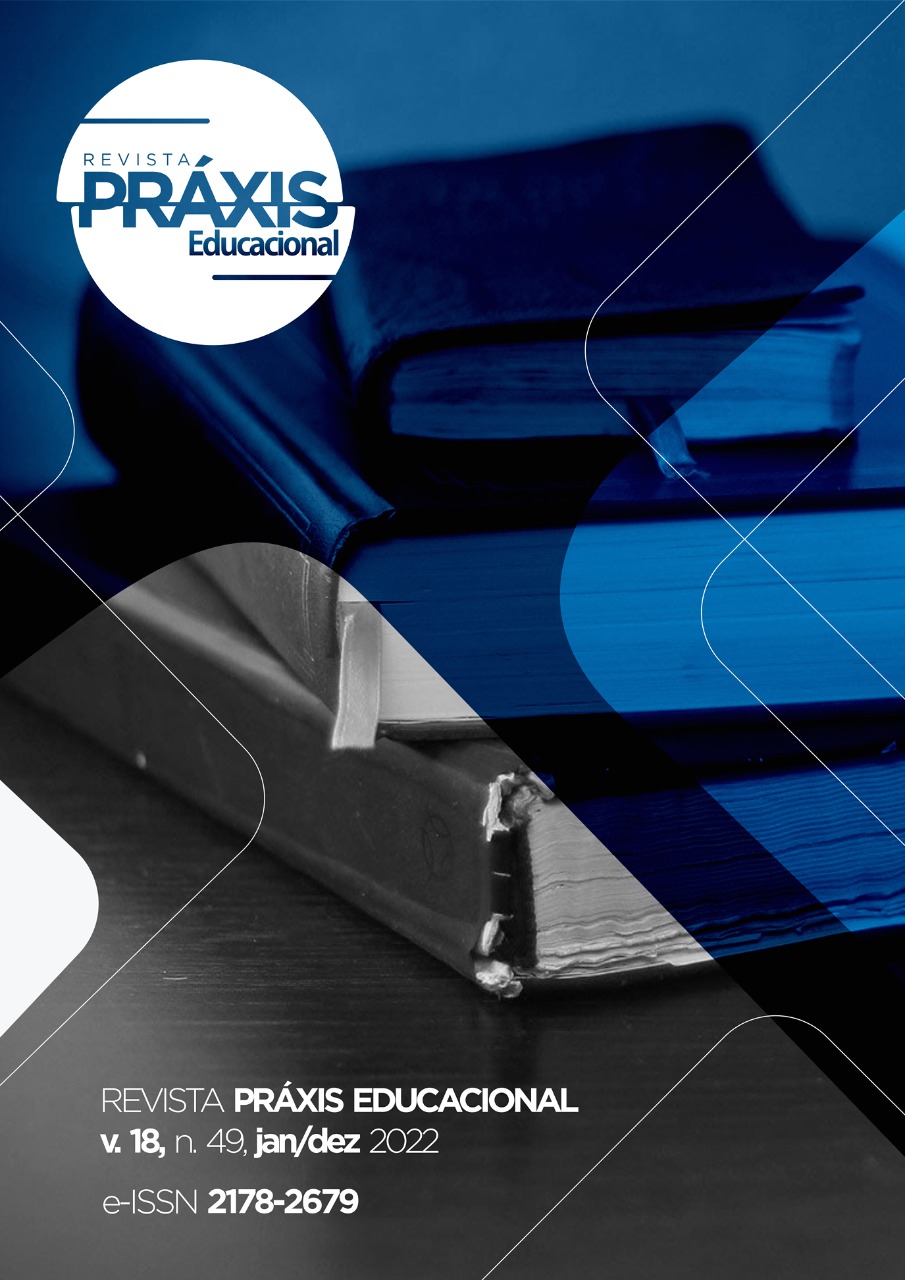The construction of pedagogical practices in basic education in times of pandemic
DOI:
https://doi.org/10.22481/praxisedu.v18i49.9099Keywords:
Teacher Education, Covid-19 Pandemia, Teacher Practices.Abstract
This article presents a qualitative study of exploratory nature since it seeks greater familiarity with the problem investigated: to understand the teaching practices characteristics and construction processes, considering the early childhood education and elementary school years, in remote education related to Covid-19 pandemic, experienced by seven experienced teachers who act as mentors. The teachers proposed activities, the meeting's conversations maintained with the research team, and the WhatsApp messages exchanged by the other mentors and research team members are analyzed. The processual analysis of the data made it possible to identify/understand: i. a new meaning of teaching practice, ii. some characteristics of the working conditions of these teachers and iii. the teaching practices built for remote teaching.
Downloads
Metrics
References
ANDRÉ, Marli Eliza Dalmazo Afonso de. Texto, contexto e significado: algumas questões na análise de dados qualitativos. Cadernos de Pesquisa, [S.l.], v.45, p.66-71, maio, 1983.
ROCHA, Eloisa Acieres Candal; BUSS-SIMAO, Marcia. Infância, Experiência e Educação: apontamentos a partir de reflexões sobre a pequena infância. Childhood & Philosophy, v. 14, n.29 p. 27-42, 2018. Disponível em: <https://doi.org/10.12957/childphilo.2018.30577>. Acesso em: 23 fev. 2019.
CASTRO, Mayara Alves de; VASCONCELOS, José Gerardo; ALVES, Maria Marly. Estamos em casa!: Narrativas do cotidiano remoto da educação infantil em tempo de pandemia. Práticas Educativas, Memórias e Oralidades - Rev. Pemo, [S. l.], v. 2, n. 1, p. 1–17, 2020. Disponível em: <10.47149/pemo. v2i1.3716>. Acesso em: 09 jul. 2021.
CARRILLO, Carmen; FLORES, Maria Assunção. COVID-19, and teacher education: a literature review of online teaching and learning practices, European Journal of Teacher Education, v. 43, n. 4, p. 466-487, 2020. Disponível em <10.1080/02619768.2020.1821184>. Acesso: 04 jan. 2021.
FLORES, Maria Assunção; GAGO, Marília. Teacher education in times of COVID-19 pandemic in Portugal: national, institutional and pedagogical responses, Journal of Education for Teaching, v. 46, n. 4, 2020. p. 507-516. Disponível em: <10.1080/02607476.2020.1799709>. Acesso: 04 jan. 2021.
GATTI, Bernadete Angelina, BARRETO, Elba Siqueira de Sá, ANDRÉ, Marli Eliza Dalmazo Afonso de, ALMEIDA Patrícia Cristina Albieri de Almeida. Professores do Brasil: novos cenários de formação. Brasília: UNESCO, 2019.
GIL, Antônio Carlos. Como elaborar projetos de pesquisa. 4. ed. São Paulo: Atlas, 2002.
MARCELO, Carlos. Desenvolvimento Profissional Docente: passado e futuro. Sísifo. Revista de Ciências da Educação, n. 8, p. 7‑22, dez., 2009. Disponível em: <http://sisifo.ie.ulisboa.pt/index.php/sisifo/article/view/130>. Acesso em: 10 nov. 2011.
MATOS, São Pedro Barreto Matos, HIGUCHI, Patricia Caroline Fiorante; OLIVEIRA, Suzana Maria de Andrade. Desafios da Educação Infantil acerca do ensino remoto. Brazilian Journal of Development, v. 6, n. 12, p. 1-17, 2020. Disponível em: <https://doi.org/10.34117/bjdv6n12-345>. Acesso em: 09 jul. 2021
MIZUKAMI, Maria da Graça Nicoleti; REALI, Aline Maria de Medeiros Rodrigues. Aprender a Ser Mentora: um estudo sobre reflexões de professoras experientes e seu desenvolvimento profissional. Currículo sem Fronteiras, v. 19, n. 1, p. 113-133, jan./abr. 2019. Disponível em: <https://www.curriculosemfronteiras.org/vol19iss1articles/mizukami-reali.pdf>. Acesso em: 10 maio 2019.
MOREIRA, José Antônio; SCHLEMMER, Eliane. Por um novo conceito e paradigma de educação digital onlife. Revista UFG, v. 20, n. 26, maio, 2020. Disponível em: <https://doi.org/10.5216/revufg.v20.63438>. Acesso: 04 jan. 2021.
PÉREZ-GÓMEZ, Ángel Ignácio. Ser docente en tiempos de incertidumbre y perplejidad. Márgenes, Revista de Educación de la Universidad de Málaga, v. 0, n. 0, 2019, p 3-17. Disponível em: <http://dx.doi.org/10.24310/mgnmar.v0i0.6497>. Acesso: 05 julho 2020.
PRÍNCIPE, Lisandra; ANDRÉ, Marli Eliza Dalmazo Afonso de. Condições de trabalho na fase de indução profissional dos professores. Currículo sem fronteiras, v.19, n.1, p. 60-80, jan/abr.2019. Disponível em: <https://www.curriculosemfronteiras.org/vol19iss1articles/princepe-andre.pdf>. Acesso em: 10 maio 2019.
ROCHA, Eloisa Acieres Candal. A pedagogia e a educação infantil. Revista Brasileira de Educação, Rio de Janeiro, n. 16, p. 27-34, abr. 2001. Disponível em: <http://www.scielo.br/scielo.php?script=sci_arttext&
pid=S1413-24782001000100004&lng=en&nrm=isso>. Acesso em: 12 mar. 2018.
ROLDÃO, Maria do Céu. Formação de professores e desenvolvimento profissional. Rev. educ. PUCCamp., Campinas, 22(2):191-202, maio/ago., 2017. Disponível em: <https://doi.org/10.24220/2318-0870v22n2a3638>. Acesso em: 12 maio 2018.
RODGERS, Carol; SCOTT, Katharine. The development of the personal self and professional identity in learning to teach. In: COCHRAN-SMITH, Marilyn; FEIMAN-NEMSER, Sharon; MCINTYRE, Jonh; DEMRS, Kelly. (Eds.), Handbook of research on teacher education. New York: Macmillan, 2008, p. 732–755.
SHULMAN, Lee. Those who understand: knowledge growth in teaching. In: SHULMAN, Lee; WILSON Suzanne. (Ed.). The wisdom of practice: essays on teaching, learning, and learning to teach. 1. ed. United States of America: Jossey-Bass, 2004. p. 189-215.
VAILLANT, Denise; MARCELO, Carlos. Ensinando a ensinar. As quatro etapas de uma aprendizagem. Curitiba: UTFPR, 2012.
Downloads
Published
How to Cite
Issue
Section
License
Copyright (c) 2022 Práxis Educacional

This work is licensed under a Creative Commons Attribution-ShareAlike 4.0 International License.
You are free to:
Share - copy and redistribute the material in any medium or format; Adapt - remix, transform, and build from the material for any purpose, even commercially. This license is acceptable for Free Cultural Works. The licensor cannot revoke these freedoms as long as you follow the terms of the license.
Under the following terms:
Attribution - You must appropriately give credit, provide a link to the license, and indicate if any changes have been made. You may do so in any reasonable way, but not in a way that suggests that you or your use is endorsed by the licensor.
There are no additional restrictions - You cannot apply legal terms or technological measures that legally restrict others to make any use permitted by the license.










